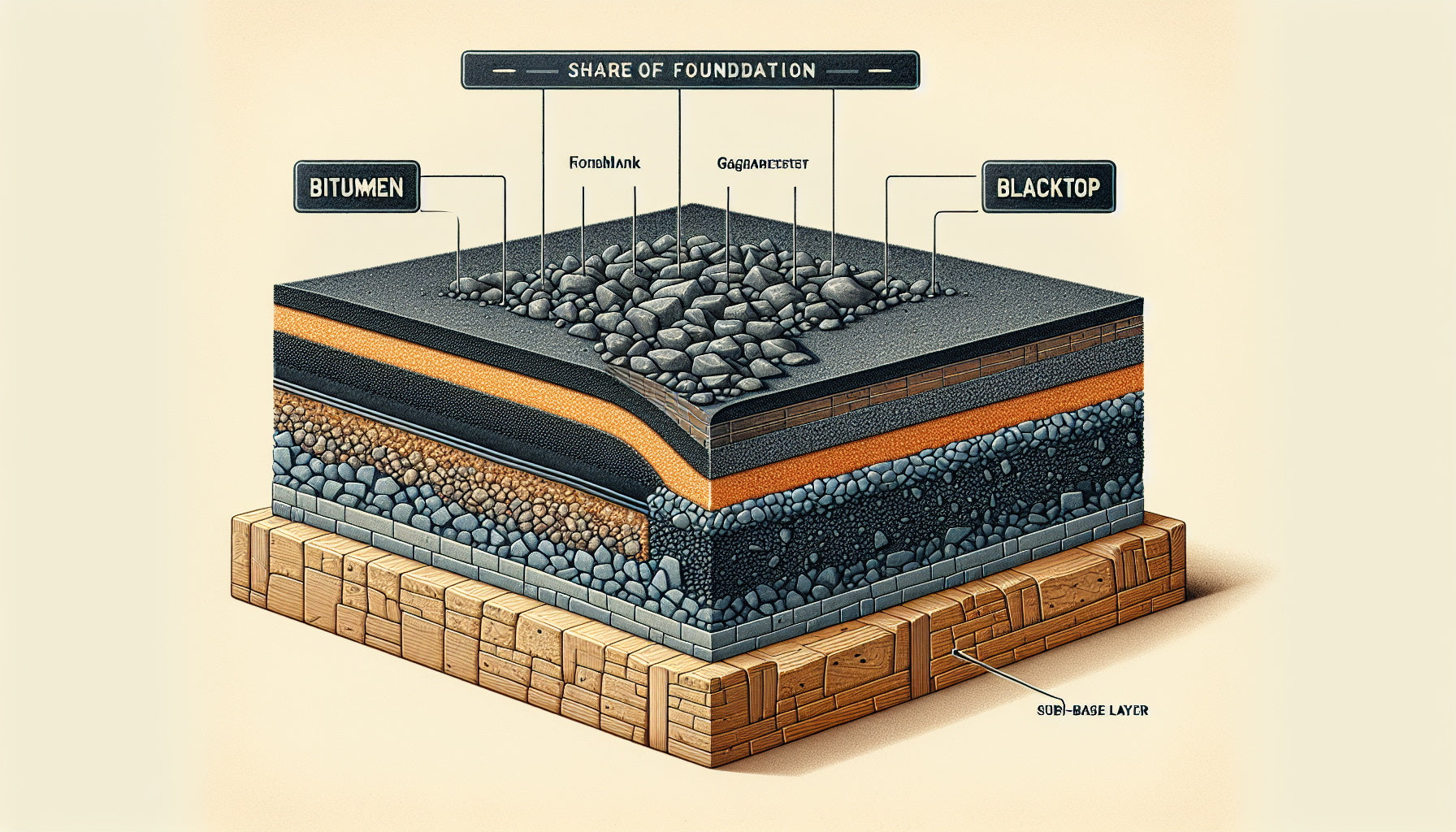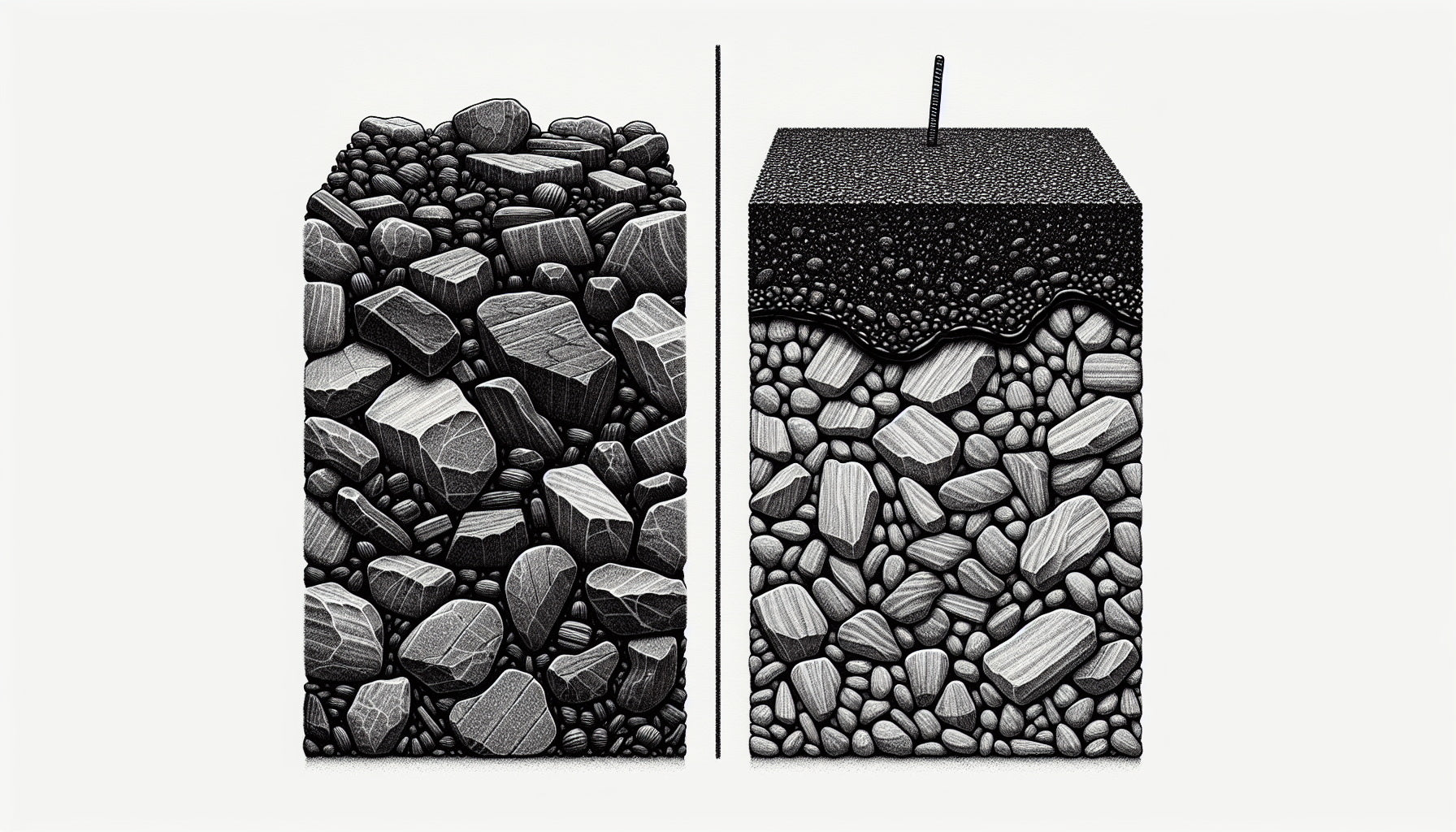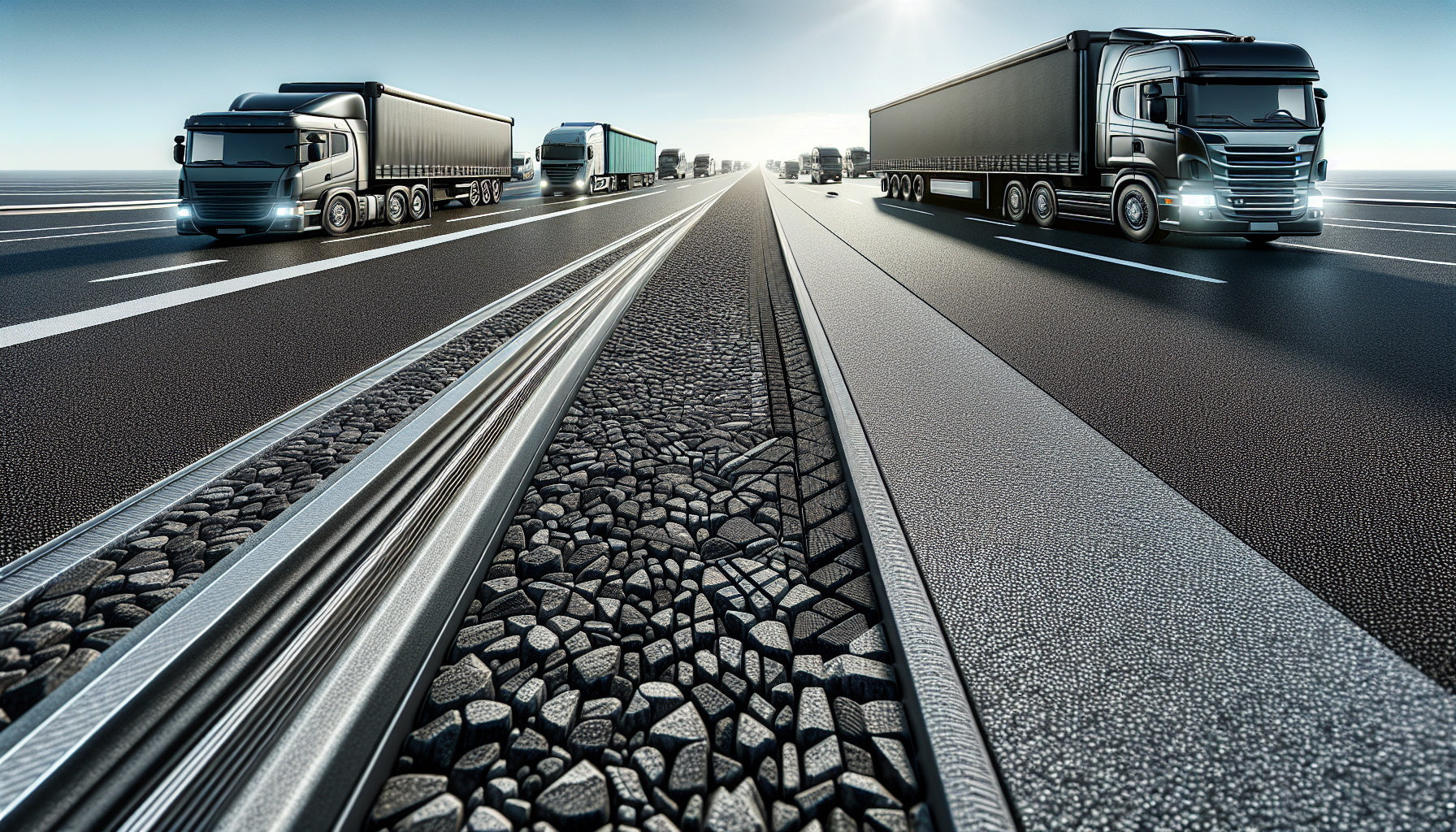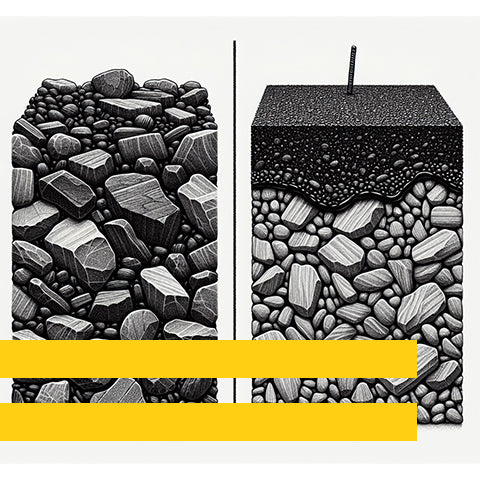Uncovering the Key Differences: Blacktop vs Asphalt for Durable Road Surfaces
Deciding between asphalt vs blacktop for your paving project can be puzzling. Each offers unique benefits depending on the application—whether it’s for a high-traffic highway or a residential driveway. This guide examines their differences and when to use each, making your choice clear and informed.
Key Takeaways
- Asphalt and blacktop share a common foundation in crushed stone and bitumen, which provides structural integrity, rapid usability after laying, and necessitates a well-prepared sub base for longevity.
- Distinct compositions set asphalt and blacktop apart; blacktop has more stone and a different binder type, influencing appearance, suitability for light-traffic areas, and grip, whereas asphalt, designed to withstand heavier loads, is favored for industrial uses and high-traffic roads.
- Maintenance and timely repairs are pivotal for both asphalt and blacktop surfaces; regular cleaning, sealcoating, and addressing cracks early contribute to extending their lifespan and preventing extensive damage.
Unveiling the Core Similarities: The Shared Foundation of Asphalt and Blacktop

Both asphalt and blacktop are crafted from a similar mix of materials, including crushed stone and bitumen, a sticky, tar-like substance that functions as an adhesive binder. This binder is crucial in fusing the aggregate components together to form a solid structure. Thanks to this combination of elements, these materials provide the durability and toughness necessary for various paving applications. It’s also vital that there be an appropriately prepared sub base beneath them to ensure their longevity and efficacy.
One notable advantage of using either material is their quick readiness post-application. Asphalt and blacktop surfaces can be utilized fairly shortly after being installed, which helps expedite project timelines significantly — reducing inconveniences typically associated with lengthy construction processes on driveways or heavily trafficked roads. The swift turnaround time before these pavement options can bear traffic often proves highly beneficial for such projects.
Breaking Down the Composition: What Sets Asphalt and Blacktop Apart

Asphalt and blacktop are often confused due to their similarities, yet there are notable differences in asphalt that distinguish them. One of the primary distinctions is their material composition. To asphalt, blacktop has a higher stone content within its mixture, resulting in a sparkly appearance and a more textured surface. Due to these qualities, blacktop is frequently chosen for home driveways and areas with lighter traffic where aesthetics play an important role.
Conversely, the type of binder used between these two materials varies as well—blacktop relies on bitumen-based binders whereas asphalt uses those derived from petroleum products. These compositional variations influence how each material performs under different conditions. Because it contains greater amounts of bitumen in its mixtures compared with blacktop’s composition, Asphalt exhibits enhanced durability that makes it ideal for industrial settings subjected to heavy loads or high-volume traffic scenarios.
Matching Material to Project: When to Choose Asphalt Over Blacktop (and Vice Versa)
Selecting an appropriate substance for your paving project is essential for its durability and longevity. The distinct characteristics of asphalt and blacktop make them uniquely advantageous depending on their application, from a residential driveway to a heavily trafficked highway. Understanding the differences between these materials is pivotal in influencing the surface’s endurance and overall success of the paving endeavor.
Picking Blacktop for Residential and Light-Traffic Areas

Blacktop is highly regarded for application in residential zones and areas with minimal traffic due to its sleek, dark finish that not only enhances visual appeal but also suits the appearance of driveways and smaller paving projects. The combination of this visual charm and simple upkeep has led to blacktop’s popularity among homeowners and small business owners.
Compared to other materials, blacktop boasts a rougher texture which contributes significantly to increased traction. This improved grip helps in minimizing accidents within spaces such as parking lots and playgrounds. Consequently, these safety benefits contribute greatly to why many opt for blacktop when considering surfacing solutions for places subject to lighter traffic loads.
Selecting Asphalt for Highways and Heavy-Duty Surfaces

Asphalt is highly regarded for its exceptional performance in high-demand scenarios, thanks to a strong petroleum-based binder that provides increased resilience against the ravages of use. Such robustness renders asphalt exceedingly appropriate for highways and conditions involving heavy loads where enduring strength is crucial.
The substantial weight-bearing capacity of asphalt earns it widespread endorsement from industry professionals for all-condition roadways, surpassing blacktop solutions. Specific formulations like 41B are crafted with a denser aggregate composition tailored to carry heavier burdens, thereby being particularly well-suited for surfaces on heavily trafficked highways and areas subjected to dense traffic flow. Different types such as hot mix asphalt (HMA) and warm mix asphalt play pivotal roles in constructing roads and parking lots intended to endure large volumes of vehicular activity.
The Durability Factor: How Weather Conditions Impact Asphalt and Blacktop
Recognizing the influence of weather conditions on the durability of both asphalt and blacktop is crucial when selecting materials for paving. The resilience and performance of these surfaces under varying climatic situations are determined by the different binders they contain.
Asphalt comes equipped with a variety of durable characteristics, such as resistance to skidding, an enhanced ability to melt snow and ice quickly, reduced glare from sunlight, and robustness against cycles involving freezing temperatures followed by thawing and salt used for de-icing roads. Despite its strengths, asphalt can suffer damage due to intense exposure to UV rays causing brittleness through oxidation or fluctuations in temperature combined with heavy rainfall that leads to degradation as melted ice mixes with water.
Blacktop too demands effective drainage solutions so as not to allow standing water, which might soften its structure over time, leaving it vulnerable to developing cracks or creating potholes.
Cost-Effectiveness and Longevity: Analyzing the Economic Advantages
Asphalt, often referred to as blacktop, is known for its cost-effectiveness and durability. On average, the installation of this surface material can run between $3 to $4 per square foot, making it a financially attractive option for projects that need to adhere to tight budgets.
In contrast to blacktop’s lower initial expenses, asphalt surfaces are valued for their superior longevity thanks in part to their petroleum-based composition. Asphalt’s robust nature not only adds years of use—with potential lifespans reaching two decades—but also boasts an environmentally-friendly aspect being fully recyclable. Maintaining its condition over time requires resurfacing approximately every three years.
Despite these facts about asphalt’s resilience and sustainability benefits compared with traditional blacktops which have higher maintenance costs down the line due primarily because they’re more resistant against minor damage owing to flexibly properties. Considering overall lifetime expenses—maintenance included—as well as lifespan expectations when properly cared for suggests that while upfront investment may be greater than those associated specifically toward installing just any type of pave job or fill work etcetera but ultimately provides fewer outlays long term thereby offering an even better value proposition all things considered regardless of whether you choose the go route versus other alternatives available market today.
Maintenance and Repairs: Keeping Your Surface in Top Condition
To ensure your surface remains in prime condition, whether it’s made of asphalt or blacktop, it’s essential to perform routine maintenance to the asphalt and address repairs promptly throughout the life of your project.
Strategies to Maintain and Extend the Life of Blacktop
Proper care of your parking lot’s asphalt surface can substantially prolong its lifespan. It is vital to carry out regular upkeep, which includes sweeping on a weekly or monthly basis to eliminate debris and maintain safe conditions for use. Applying sealcoating to the blacktop every three to five years acts as an additional safeguard by providing resistance against moisture, fuel, oil spills and ultraviolet radiation—thereby improving both resilience and aesthetic quality.
Maintenance strategies for preserving asphalt also encompass:
- Utilizing non-harmful cleaning agents specifically designed for use on asphalt in order to fend off substances known for accelerating surface wear
- Integrating expert recommendations into tailored upkeep programs
- Conducting consistent visual inspections as part of overall property maintenance routines
- Promptly addressing minor fissures using sealing products before they evolve into more severe cracks that necessitate comprehensive repairs.
It’s imperative that proper drainage systems are implemented within a parking lot setting. This avoids the accumulation of standing water, which poses a threat through potential damage inflicted upon blacktop surfaces due to prolonged exposure.
Fixing Asphalt: Techniques to Repair Cracks and Potholes

Similar to blacktop surfaces, asphalt also necessitates consistent upkeep to preserve its functional condition. The development of potholes and cracks is a frequent concern, typically resulting from water that seeps into or underneath the surface layer, freezes, then expands. Addressing these issues promptly can inhibit Damage from occurring and prevent more costly repairs.
Prompt attention to sealing any visible fissures on an asphalt roadway aids in blocking moisture entry and curbs additional degradation of the pavement. Utilizing cold patch asphalt repair techniques or hot crack filler with a crack filling machine for pothole fixes is advantageous as it bonds with both damp and arid asphalt surfaces alike. It’s able to be packed down immediately, which permits traffic flow to resume swiftly.
Taking early action against small-sized crevices by applying sealant helps prevent them from expanding into more severe splits within the surface. When faced with wider fractures exceeding 1/8 inch across, concentrated efforts become necessary following a thorough cleaning of those compromised zones in order to properly mend them.
Expert Insights from Kevin King: Leveraging Years of Paving Experience
Diving into the intricacies of asphalt and blacktop, we consult Kevin King—an industry authority and established blog writer at Asphalt Industrial in Los Angeles, California. Kevin is known for his profound understanding of maintaining asphalt surfaces as well as advising on top-tier equipment tailored for these tasks.
Kevin’s wealth of experience has earned him a commendable reputation within the paving and asphalt domain. His detailed guidance assists both individuals and organizations to navigate through their paving endeavors thoughtfully while also shedding light on the sophisticated details inherent in this sector.
Summary
In summary, asphalt and blacktop each come with their own set of pros and cons, which make them appropriate for particular uses. The decision on the optimal material hinges on a thorough grasp of your project’s demands as well as the operational conditions anticipated for the surface.
The selection is tailored to individual requirements and tastes—whether it is opting for blacktop due to its visual charm and simple upkeep suited for home environments and areas with minimal traffic or preferring asphalt because of its robustness and capacity to withstand heavy loads on highways and intensive-use surfaces. With this insight in hand, you are well-equipped to proceed with your paving endeavor, poised for a result that offers enduring quality.
Frequently Asked Questions
What is better asphalt or blacktop?
Blacktop, due to its substantial content of crushed stones, tends to be more durable than asphalt, often enduring for several months or years longer.
Despite blacktop’s robustness, asphalt distinguishes itself with exceptional waterproofing capacities and the capability to support considerably heavier loads compared to blacktop.
How do I know if my driveway is asphalt or blacktop?
Examining their composition reveals the distinction between asphalt and blacktop. Compared to blacktop, which includes natural stones that give it a sparkly appearance, asphalt features varying mixture ratios and is subject to different temperature changes.
What type of asphalt is best for driveways?
Hot mix asphalt, a combination of aggregate and asphalt cement heated to create the final substance, is considered the optimal choice for residential driveway paving. This mixture is poured directly at the site where it will be used and then shaped through compaction.
Is blacktop good for a driveway?
Indeed, a blacktop driveway that has been correctly installed presents an economical and adaptable solution capable of withstanding varying climate conditions and temperature changes.
What are the main differences between asphalt and blacktop?
Asphalt and blacktop differ primarily in their composition and intended use. Blacktop, designed for residential areas and places with lighter traffic, contains a greater proportion of stone mixed with a bitumen-based binder. In contrast, asphalt is formulated for surfaces that must endure heavy-duty use. It has a higher concentration of bitumen along with a petroleum-derived binder to meet these demands.


